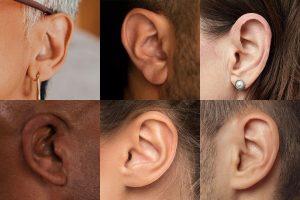 On a recent, overbooked flight, me and the guy behind me—we were at the end of the boarding line—were upgraded to first class. We scurried to stow our carry-ons and buckle in. Buzzed from the unexpectedness of that random sprinkling of fortune, I sank into my leather-upholstered seat, stretched out my legs, and shut my eyes.
On a recent, overbooked flight, me and the guy behind me—we were at the end of the boarding line—were upgraded to first class. We scurried to stow our carry-ons and buckle in. Buzzed from the unexpectedness of that random sprinkling of fortune, I sank into my leather-upholstered seat, stretched out my legs, and shut my eyes.
When I heard the click of my seatmate’s phone, I opened my eyes slightly and watched with my peripheral vision as he snapped his way through takeoff. Photos out the window. Photos of the laminated safety instructions tucked into his seat pocket. Selfies of him beaming.
I closed my eyes again. He tapped me on the shoulder. “Hello good madam,” he said. His English had a faint British accent. “This is the second airplane flight of my life.” It was then that I really looked at him, giving him my full attention. He was thin with an enthusiastic mop of dark, curly hair. He looked to be in his 40s, and his eyes were wide with excitement.
I nodded and small smiled at him, a response that I calibrated to convey politeness but not encouragement. He either didn’t read my cues or he took my response as an invitation. He held his phone aloft and turned the screen toward me. “This is my family. We are from India. We are having a party for my son.” I saw a crowded table, plates heaped with food, bright colors, big smiles. I also saw a juncture in our encounter.
As I took in the image, I rapid cycled through the situational calculus. Do I engage further and converse? Should I shut my eyes again, signaling a desire to be left alone? Would he be talking for the entire 3-hour flight? I factored in my curiosity about a grown man who has only flown twice in his life. But the clincher was that I was returning home from a conference where one of the most compelling speakers had given a talk about what she called the lost art of listening. At the conference I had scribbled several of her ideas into my notebook, especially her point of view that listening to a stranger is possibly one of the kindest and most generous things you can do. Beneath it, I had also written this notion of hers: “To listen poorly, selectively or not at all is to limit your understanding of the world.”
I looked from the phone screen into my seatmate’s eyes. “Everyone looks very happy in your photo,” I said. He nodded and began scrolling to find more photos. For most of the flight he told me small, earnest, and heartbreaking stories of his loneliness, his fear of flying, his need to leave his family to find work abroad that could support them. I asked question after question.
And I listened.
I teach a media writing course at my university. In the second half of the semester my 19- and 20-year-old students must each find a subject who interests them and conduct a lengthy, face-to-face interview. When I outline the assignment, they express anxiety about talking with strangers, uncertainty about how to navigate the encounter, and wariness about the possibility of what one student called “cringe and maximum awkwardness.”
They want to talk about questions but I steer them toward talking about listening. They tell me they don’t know how to listen well. They talk about the difficulty of muting the noise in their heads, the fatigue of really paying attention, their atrophied listening muscles because they favor communicating via text.
I ask them to consider what it is we all so deeply want: To be understood. To be heard. To be seen as a person with ideas and emotions that are worthy and deserving of attention. We convey that attention through listening. Turn on your recording devices, I tell them, but also turn on your listening. It is an act of generosity.
A week later they come into class and relay their experiences. They talk about surprise, difficulties, ease. But mostly they talk about connection, about feeling as if something happened between them and their subjects, something that, as one student said, “felt a little like falling in love.”
It is love, isn’t it, when we chance upon someone with whom we feel seen, recognized? A stranger, a journalist, a hairdresser, a bartender—we talk, they listen. And we feel good.
As the students tell their interview stories, I think of something my favorite poet, W.S. Merwin, once told an interviewer: “We must want to listen.”
Sometimes I want to. It helps that I get to talk about listening with my students, watch some of them experience it as what psychiatrist Karl Menninger calls “a magnetic and strange thing, a creative force.” My students help me remember to want to listen. And when I don’t, I think of the man on the plane beside me, taking his second airplane flight. The man who had so much to say.

